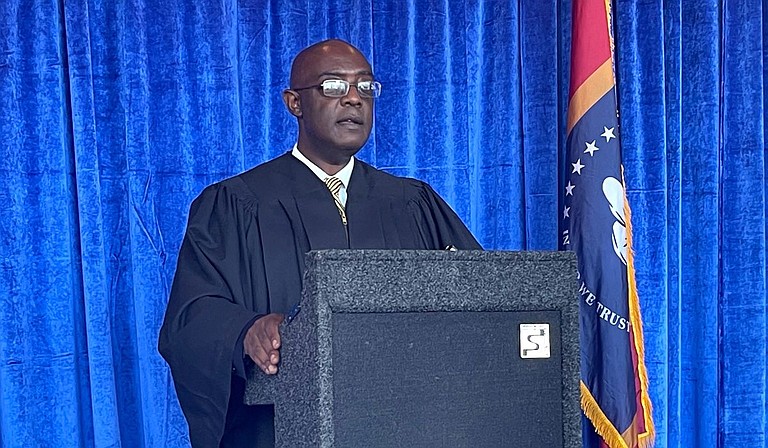Hinds Circuit Drug Intervention Court Judge Winston Kidd handed out certificates of completion to 26 people who graduated from the drug program on July 28, 2021. Photo by Kayode Crown
Monday, August 9, 2021
Veronica Coleman, 33, graduated from the Hinds Circuit Drug Court on July 28, 2021. The mother of four believes the program was a lifeline. "If it weren't for them, I would have been still out here on drugs, I would have been messing my life up, I would've been locked up, and I wouldn't have been seeing my kids no more," Coleman told the Jackson Free Press outside Hinds County Courthouse, where the graduation ceremony took place.
Hinds County Circuit Court Senior Judge Tomie Green appointed Judge Winston Kidd to oversee the drug court in 2011. Kidd told the Jackson Free Press after the July 28 graduation ceremony for 26 people that 107 people are currently in the program.
"The individuals who received certificates were in our circuit-court drug program for a minimum of two years, where they had to be drug-tested, get a diploma, keep a job and stay out of trouble," he said. "So it's a process that they go through, and once they meet all those requirements, then they're eligible to graduate."
Kidd explained that those who joined the program had charges of nonviolent felony crimes. In return for complying with the terms of the program, the court dismisses those charges upon graduation.
"What we're trying to do is turn their lives around and give them an opportunity to be a productive member of society, rather than being a burden on our criminal justice system, rather than being a burden on society," the judge explained.
"When I compare it to my regular court, where I have to send individuals to jail, (where) those individuals can't work, they can't provide for their families, and they are burdens on the taxpayers. Versus if you were in the drug court and graduate, then you're not a burden on the system, and you were out and able to support your family."
Kidd said it is the exception and not the norm for participants to go through the program within two years, as many struggle and have a maximum of five years to complete it. He mentioned Mississippi State Hospital as the primary treatment provider. Others include Hinds Behavioral Health Services, Harbor House Chemical Dependency Services, Alcohol Services Center, and Improving Quality of Life Inc.
"The typical drug court participant is an individual who has had a lifetime of drug abuse," Kidd said. "A lot of these individuals tell me they started when they were 12, when they were very young."
Mississippi Administrative Office of Courts Public Information Officer Beverly Pettigrew Kraft said in a July 26 email statement that the drug court reduces recidivism.
"Intervention courts seek to rehabilitate drug-using offenders through drug treatment and intense supervision with drug testing and frequent court appearances," she stated. "Intervention courts provide participants access to resources and opportunities they need by coordinating the efforts of the judiciary, prosecution, defense counsel, probation, law enforcement, treatment, mental health, and social service providers."
Coleman said that though she had stopped "smoking weed," it was harder to shake her addiction to controlled substances, and it took her a long time to complete the program.
"And it was hard for me to stop. And I kept on doing it, and I kept on doing it, and I kept coming up here hot (testing positive), and I had to think to myself like I need to stop because it's not getting me nowhere. It got me in a lot of trouble," she told the Jackson Free Press.
While she credited the program for keeping her out of jail, Coleman is worried about getting a job after graduation.
"I know it probably would be hard for me to get a job right now. I know there's a felony on my background (different from the one which brought her to the drug court) right now, so it might be hard for me to get a job right now," Coleman said.
Email story tips to city/county reporter Kayode Crown at [email protected]. Follow him on Twitter at @kayodecrown.

Comments
Use the comment form below to begin a discussion about this content.
Sign in to comment
Or login with:
OpenID